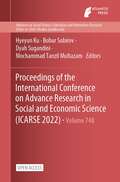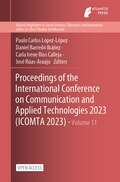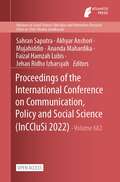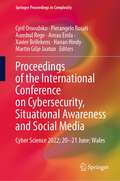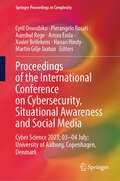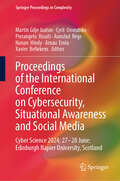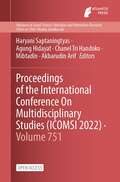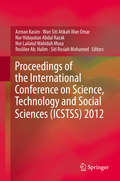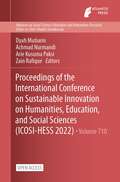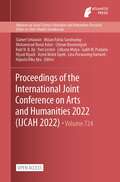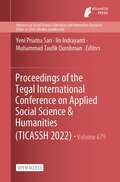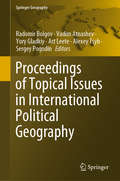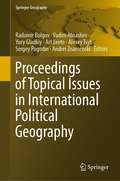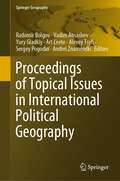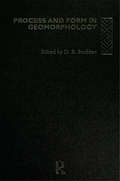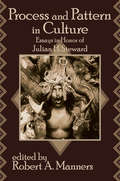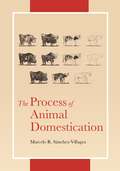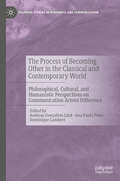- Table View
- List View
Proceedings of the International Conference on Advance Research in Social and Economic Science (Advances in Social Science, Education and Humanities Research #748)
by Hyeyun Ku Bobur Sobirov Dyah Sugandini Mochammad Tanzil MultazamThis is an open access book.ThemeOptimizing the use of social science and economics in the post-pandemic revival eraThe Covid-19 pandemic is slowly starting to be overcome. Contributions from various disciplines are also needed in the context of post-pandemic recovery, including the fields of social science and economics. Thus, the International Conference on Advanced Research in Social and Economic Science is a forum for researchers and practitioners to exchange ideas and advances on how emerging research methods and sources are applied to various fields of the social sciences, as well as discuss current and future challenges. Join the social sciences conference as we explore the latest trends in social sciences and discuss common challenges in politics, social, communication, humanities, networking society, business, sustainable development, and international relations.
Proceedings of the International Conference on Communication and Applied Technologies 2023 (Atlantis Highlights in Social Sciences, Education and Humanities #11)
by Paulo Carlos López-López Daniel Barredo Ibáñez Carla Irene Ríos Calleja José Rúas-AraújoThis is an open access book.ICOMTA’23 – The 2023 International Conference on Communication and Applied Technologies has as organizing entities the Universidad del Rosario (Bogota, Colombia) and the Benemerita Universidad Autonoma de Puebla (Mexico); and as collaborators at the Universidade de Vigo (Galicia, Spain), Universidade de Santiago de Compostela-Equipo de Investigaciones Políticas (Galicia, España), International Media Management Academic Association (IMMAA) and International Research Network of Communication Management (XESCOM).The conference, which will take place at the Angelopolis Campus of the Benemerita Universidad Autonoma de Puebla between September 6, 7 and 8, 2023, will take place in a mixed mode (face-to-face and virtual).
Proceedings of the International Conference on Communication, Language, Education and Social Sciences (Advances in Social Science, Education and Humanities Research #704)
by Sareen Kaur Bhar Hawa RahmatThis is an open access book.The 3rd International Conference on Communication, Language, Education and Social Sciences (CLESS 2022) will be held on 25-27 July 2022. This year’s conference will be a part of the bigger Digital Future Congress (DIFCON) comprising of various other conferences in different fields and will be held online. CLESS 2022 is unique in which it combines communication, language, education, and social science in an international academic conference. The aim of CLESS 2022 is to offer a platform for both local and international academics, educators, researchers and other professionals to meet, share and discuss latest research, trends, ideas and innovation in the field of communication, language, education, psychology and social sciences. The conference is aimed to provide a platform for young researchers as well as to support and encourage other researchers to present their research, to network within the international community of researchers and to share and seek the insight and advice of successful senior researchers all over the world during the conference.
Proceedings of the International Conference on Communication, Policy and Social Science (Advances in Social Science, Education and Humanities Research #682)
by Sahran Saputra Akhyar Anshori Mujahiddin Ananda Mahardika Faizal Hamzah Lubis Jehan Ridho IzharsyahThis is an open access book. The Faculty of Social and Political Sciences, University of Muhammadiyah North Sumatra (FISIP UMSU) initiated and held a International Conference under the name International Conference On Communication, Policy And Social Science (INCCLUSI) 2022 on February 22, 2022 with thema “Collaboration of Government, Civil Society and Digital Communication for Sustainable Development Goals”. Deliberately this conference took the topic in order to bring the carriage of social science and political science to jointly take an important role in the achievement of the goals of the “Sustainable Development Goals” which are currently the development framework of countries in the world replacing the Millennium Development Goals or MDGs, especially in Indonesia. The physical form of the results of this national conference are actual and interesting scientific records that are poured in the form of Proceedings or paper gatherings that are expected to provide the widest benefits to various circles as a positive contribution of presenters in this activity.
Proceedings of the International Conference on Cybersecurity, Situational Awareness and Social Media: Cyber Science 2022; 20–21 June; Wales (Springer Proceedings in Complexity)
by Cyril Onwubiko Pierangelo Rosati Aunshul Rege Arnau Erola Xavier Bellekens Hanan Hindy Martin Gilje JaatunThis book highlights advances in Cyber Security, Cyber Situational Awareness (CyberSA), Artificial Intelligence (AI) and Social Media. It brings together original discussions, ideas, concepts and outcomes from research and innovation from multidisciplinary experts. It offers topical, timely and emerging original innovations and research results in cyber situational awareness, security analytics, cyber physical systems, blockchain technologies, machine learning, social media and wearables, protection of online digital service, cyber incident response, containment, control, and countermeasures (CIRC3). The theme of Cyber Science 2022 is Ethical and Responsible use of AI. Includes original contributions advancing research in Artificial Intelligence, Machine Learning, Blockchain, Cyber Security, Social Media, Cyber Incident Response & Cyber Insurance.Chapters “Municipal Cybersecurity—A Neglected Research Area? A Survey of Current Research", "The Transnational Dimension of Cybersecurity: The NIS Directive and its Jurisdictional Challenges" and "Refining the Mandatory Cybersecurity Incident Reporting under the NIS Directive 2.0: Event Types and Reporting Processes” are available open access under a Creative Commons Attribution 4.0 International License via link.springer.com.
Proceedings of the International Conference on Cybersecurity, Situational Awareness and Social Media: Cyber Science 2023; 03–04 July; University of Aalborg, Copenhagen, Denmark (Springer Proceedings in Complexity)
by Cyril Onwubiko Pierangelo Rosati Aunshul Rege Arnau Erola Xavier Bellekens Hanan Hindy Martin Gilje JaatunThis book highlights advances in cyber security, cyber situational awareness (CyberSA), artificial intelligence (AI) and social media. It brings together original discussions, ideas, concepts and outcomes from research and innovation from multidisciplinary experts. It offers topical, timely and emerging original innovations and research results in cyber situational awareness, security analytics, cyber physical systems, blockchain technologies, machine learning, social media and wearables, protection of online digital service, cyber incident response, containment, control and countermeasures (CIRC3). The theme of Cyber Science 2023 is multidisciplinary and multidimensional cyber security. And through call for papers, we solicit original contributions advancing research in artificial intelligence, machine learning, blockchain, cyber security, social media, cyber incident response and cyber insurance.
Proceedings of the International Conference on Cybersecurity, Situational Awareness and Social Media: Cyber Science 2024; 27–28 June; Edinburgh Napier University, Scotland (Springer Proceedings in Complexity)
by Pierangelo Rosati Martin Gilje Jaatun Cyril Onwubiko Aunshul Rege Arnau Erola Xavier Bellekens Hanan HindyThis book presents peer-reviewed articles from Cyber Science 2024, held on 27–28 June at Edinburgh Napier University in Scotland. With no competing conferences in this unique and specialized area (cyber science), especially focusing on the application of situation awareness to cyber security (CS), artificial intelligence, blockchain technologies, cyber physical systems (CPS), social media and cyber incident response, it presents a fusion of these unique and multidisciplinary areas into one that serves a wider audience making this conference a sought-after event. Hence, this proceedings offers a cutting edge and fast reaching forum for organizations to learn, network, and promote their services. Also, it offers professionals, students, and practitioners a platform to learn new and emerging disciplines.
Proceedings of the International Conference On Multidisciplinary Studies (Advances in Social Science, Education and Humanities Research #751)
by Haryani Saptaningtyas Agung Hidayat Chanel Tri Handoko Mibtadin Akbarudin ArifThis is an open access book. 1st International Conference on Multidisciplinary Studies (ICoMSi) offers a track of quality R&D from key researchers and experts. It provides an opportunity in bringing in the new hope and horizons that will contribute to Advanced research and policy on Culture, Environment, Health, and Community Development after pandemic. All submitted papers will be under peer review and accepted papers will be published in the conference proceeding. Both academia, activists and industries are invited to present their papers dealing with state-of-art research, sustainable developments, and goods practices of community development after pandemic.
Proceedings of the International Conference on Science, Technology and Social Sciences (ICSTSS) 2012
by Azman Kasim Wan Siti Atikah Wan Omar Nor Hidayatun Abdul Razak Nor Lailatul Wahidah Musa Roslilee Ab. Halim Siti Rosiah MohamedThis biannual conference in Pahang, Malaysia, is a clearing house for many of the latest research findings in a highly multidisciplinary field. The contributions span a host of academic disciplines which are themselves rapidly evolving, making this collection of 90 selected papers an invaluable snapshot of an arena of pure and applied science that produces many versatile innovations. The book covers a multitude of topics ranging from the sciences (pure and applied) to technology (computing and engineering), and on to social science disciplines such as business, education, and linguistics. The papers have been carefully chosen to represent the leading edge of the current research effort, and come from individuals and teams working right around the globe. They are a trusted point of reference for academicians and students intending to pursue higher-order research projects in relevant fields, and form a major contribution to the international exchange of ideas and strategies in the various technological and social science disciplines. It is the sheer scope of this volume that ensures its relevance in a scientific climate with a marked trend towards disciplinary synthesis.
Proceedings of the International Conference on Sustainable Innovation on Humanities, Education, and Social Sciences (Advances in Social Science, Education and Humanities Research #710)
by Dyah Mutiarin Achmad Nurmandi Arie Kusuma Paksi Zain RafiqueThis is an open access book.This proceeding consists of research presented in ICOSI UMY, on 20-21 July 2022 at Universitas Muhammadiyah Yogyakarta. The conference covers the topic of governance, international relations, law, education, humanities, and social sciences. The COVID-19 pandemic first time that occurred in 2019, has brought many changes that constrain all countries to adapt quickly. The crisis has shown vulnerabilities and gaps in several primary systems, including healthcare, social protection, education, value chains, production networks, financial markets, and the ecosystem.One of the efforts that each country can take to rise from the COVID-19 pandemic is through strengthening multilateralism, international solidarity, and global partnerships. Hence, this conference raises the central theme “Strengthening Global Partnership for Resilience.” This theme covers sub-themes that allow prospective scholars to submit their papers for ‘Virtual Conferences’ presentation under the following scopes: Social Sciences, Humanities, Educations, and Religious Studies. Presented papers will also get a chance to be published in our remarkable partner publishers. Through the International Symposium on Social, Humanities, Education, and Religious Studies (ISSHERS) and Asian Conference on Comparative Laws (Asian-COL), we hope that participants will express their innovative and creative ideas to provide benefits and contribute knowledge to strengthen global partnerships among countries.Finally, all 75 papers published in this proceedings are expected not only as research output but can be developed further into prototypes or evidence for policy making.
Proceedings of the International Joint Conference on Arts and Humanities 2022 (Advances in Social Science, Education and Humanities Research #724)
by Slamet Setiawan Wulan Patria Saroinsong Muhammad Nurul Ashar Chinun Boonrongrut Rojil N. B. Aji Yuni Lestari Lillyana Mulya Galih W. Pradana Riyadi Riyadi Azmil Mohd Tayeb Lina Purwaning Hartanti Hujuala Rika AyuThis is an open access book. This joint conference features four international conferences: International Conference on Education Innovation (ICEI), International Conference on Cultural Studies and Applied Linguistics (ICCSAL), International Conference on Research and Academic Community Services (ICRACOS), and International Conference of Social Science and Law (ICSSL).It encourages dissemination of ideas in arts and humanities and provides a forum for intellectuals from all over the world to discuss and present their research findings on the research areas. This conference was held in Surabaya, East Java, Indonesia on September 10, 2022 – September 11, 2022.We are inviting academics, researchers, and practitioners to submit research-based papers or theoretical papers that address any topics within the broad areas of Arts and Humanities.
Proceedings of the Second International Conference on the Future of ASEAN (ICoFA) 2017 – Volume 2: Science And Technology
by Mohd Azwan Abbas Rizauddin SaianThis book examines how business, the social sciences, science and technology will impact the future of ASEAN. Following the ASEAN VISION 2020, it analyses the issues faced by ASEAN countries, which are diverse, while also positioning ASEAN as a competitive entity through partnerships. On the 30th anniversary of ASEAN, all ASEAN leaders agreed to the establishment of the ASEAN VISION 2020, which delineates the formation of a peaceful, stable and dynamically developed region while maintaining a community of caring societies in Malaysia, Indonesia, Singapore, Brunei, Vietnam, Thailand, the Philippines, Myanmar, Laos and Cambodia. In keeping with this aspiration, Universiti Teknologi MARA Perlis took the initial steps to organise conferences and activities that highlight the role of the ASEAN region. The Second International Conference on the Future of ASEAN (ICoFA) 2017 was organised by the Office of Academic Affairs, Universiti Teknologi MARA Perlis, to promote more comprehensive integration among ASEAN members. This book, divided into two volumes, offers a useful guide for all those engaged in research on business, the social sciences, science and technology. It will also benefit researchers worldwide who want to gain more knowledge about ASEAN countries
Proceedings of the Tegal International Conference on Applied Social Science & Humanities (Advances in Social Science, Education and Humanities Research #679)
by Yeni Priatna Sari Iin Indrayanti Muhammad Taufik QurohmanThis is an open access book. The online conference hosted by Universitas Pendidikan Indonesia. This online conference aims (1) to bring together the researchers and practitioners, students, and civil society organization representatives in the scientific forum; (2) to share and to discuss theoretical and practical knowledge about innovation in Post-pandemic sociological studies, Building better education post-pandemic era and bringing back tourism after the pandemic. Specifically, this conference can be used as a scientific forum for accommodating discussion among researchers in the field of education, sociological studies and communication science.
Proceedings of Topical Issues in International Political Geography (Springer Geography)
by Radomir Bolgov Vadim Atnashev Yury Gladkiy Art Leete Alexey Tsyb Sergey PogodinThis proceedings book addresses the main issues of contemporary political geography and international relations, providing a platform for discussion and collaboration of experts in the fields of Political Geography, Geopolitics, International Relations, and International Law. Participants from all over the world consider the controversies and challenges posed by globalization, focusing, in particular, on the ideologies of globalization and regionalism, migration crises, prevention of ethnic conflicts, and measures to counteract racism, xenophobia, and extremism
Proceedings of Topical Issues in International Political Geography (Springer Geography)
by Radomir Bolgov Vadim Atnashev Yury Gladkiy Art Leete Alexey Tsyb Sergey Pogodin Andrei ZnamenskiThis proceedings book addresses the main issues of contemporary political geography and international relations, providing a platform for discussion and collaboration of experts in the fields of Political Geography, Geopolitics, International Relations, etc. Participants from all over the world consider the controversies and challenges posed by globalization, focusing, in particular, on the ideologies of globalization and regionalism, migration crises, prevention of ethnic conflicts, and measures to promote sustainable development. The content of the book may be interesting to expert community, academics and popular audience.
Proceedings of Topical Issues in International Political Geography (Springer Geography)
by Radomir Bolgov Vadim Atnashev Yury Gladkiy Art Leete Alexey Tsyb Sergey Pogodin Andrei ZnamenskiThis proceedings book addresses the main issues of contemporary political geography and international relations, providing a platform for discussion and collaboration of experts in the fields of Political Geography, Geopolitics, International Relations, etc. Participants from all over the world consider the controversies and challenges posed by globalization, focusing, in particular, on the ideologies of globalization and regionalism, migration crises, prevention of ethnic conflicts, and measures to promote sustainable development. The content of the book may be interesting to expert community, academics and popular audience.
Process and Form in Geomorphology
by David StoddartProcess and Form in Geomorphology marks a turning point in geomorphological research. Stoddart has brought together a team of the leading international experts to offer important new studies into the processes, theory and history of landforms, and to present a framework for taking research forward into the new millenium. Illustrated throughout, Process and Form in Geomorphology takes up the challenges of the research agenda set by Richard Chorley and offers fresh insights into his unique contribution.
Process and Meaning in Spatial Archaeology: Investigations into Pre-Columbian Iroquoian Space and Place
by Eric E. Jones, Wake Forest University, John L. CreeseProcess and Meaning in Spatial Archaeology examines Northern Iroquoian archaeology through various lenses at multiple spatial levels, including individual households, village constructions, relationships between villages in a local region, and relationships between various Iroquoian nations and their territorial homelands. The volume includes scholars and scholarship from both sides of the US-Canadian border, presenting a contextualized analysis of settlement and landscape for a broad range of past Northern Iroquoian societies. The research in this volume represents a new wave of spatial research—exploring beyond settlement patterning to the process and the meaning behind spatial arrangement of past communities and people—and describes new approaches being used for better understanding of past Northern Iroquoian societies. Addressing topics ranging from household task-scapes and gender relations to bioarchaeology and social network analysis, Process and Meaning in Spatial Archaeology demonstrates the vitality of current archaeological research into ancestral Northern Iroquoian societies and its growing contribution to wider debates in North American archaeology. This cutting-edge research will be of interest to archaeologists globally, as well as academics and graduate students studying Northern Iroquoian societies and cultures, geography, and spatial analysis. Contributors: Kathleen M. S. Allen, Jennifer A. Birch, William Engelbrecht, Crystal Forrest, John P. Hart, Sandra Katz, Robert H. Pihl, Aleksandra Pradzynski, Erin C. Rodriguez, Dean R. Snow, Ronald F. Williamson, Rob Wojtowicz
Process and Pattern in Culture: Essays in Honor of Julian H. Steward
by Robert A. MannersThis festschrift commemorates Julian H. Steward. The essays were contributed by former students, colleagues, and other anthropologists whose research or thinking has been influenced by him. There was no preconceived attempt to give the volume any greater sense of unity or to impose upon the contributors any restrictions as to subject matter. On the contrary, each author was urged to write on an anthropological topic of greatest current interest to himself. Many of the essays could be placed just as handily within a division other than the one to which they have arbitrarily been assigned in the book. This kind of interchangeability may reflect, in some measure, the interrelatedness of Steward's contributions to anthropological theory.The broad relevance of all the selections to Steward's work could reflect also the extent to which his interests continue to be reflected in the work of anthropologists influenced by him. It could also reflect a parallelism of theoretical concerns within the profession that stem from the cultural ambience that produced Steward himself. Parallelisms and convergence are aspects of the kind of cultural determinism which has claimed Steward's attention during the many years that he fought a fairly lonely battle to establish the respectability of evolutionism in anthropology. Now that respectability has been achieved--with an almost bandwagon fervor--it is clear that Steward, as much as anyone else in anthropology, was "responsible" for the change.The essays in this collection are at once a vindication of his patience, an evidence of the high status he enjoys among anthropologists, and a testimony to the impact of his unusual creativity on his colleagues.
The Process and Structure of Crime: Criminal Events and Crime Analysis
by Robert F. MeletCriminology has developed strong methodological tools over the past decades, establishing itself as a competitive, sophisticated, and independent social science. Perhaps because of its emphasis on matters of design, methodology, and quantitative analysis, criminology has had few significant advances in theory. Advances in Criminological Theory is the first series exclusively dedicated to the dissemination of original work on criminological theory.The Process and Structure of Crime, the ninth volume in this landmark series, is a thorough overview of the conceptual and empirical issues raised by the adoption of a criminal event perspective, which takes into account the multifaceted character of human behavior. This book is divided into three sections: conceptual bases of criminal events, the criminal event perspective itself, and responses to criminal events. Contributors analyze and explore a wide range of topics, including: how interpersonal routines are structured through past experience; the influence of social context on interpersonal routines; criminal opportunity and its impact on criminal events; the significance of neighborhood context; the effect of victimization and fear; how problem-oriented policing efforts need to be informed by and reflect the problems of repeat offenders, repeat victims, and hot spots of crime; and finally, how changes in the physical environment constrain or limit criminal opportunities. This fascinating work will be beneficial to criminologists, sociologists, and scholars of legal studies.Contributors to this volume include: Leslie W. Kennedy, Erin Gibbs Van Brunschot, Robert F. Meier, Mark Warr, Christopher Birkbeck, Luis Gerardo Gabaldon, Kriss A. Drass, Terance D. Miethe, Julie Horney, Jeffrey Fagan, Deanna L. Wilkinson, Robert J. Buskirk, Jr., Vincent F. Sacco, Ross Macmillan, John E. Eck, Paul J. Brantingham, and Pat Brantingham.
Process Facilitation in Psychoanalysis, Psychotherapy and Social Work
by Sylvia O'NeillProcess Facilitation in Psychoanalysis, Psychotherapy and Social Work elaborates a differential theory of therapeutic engagement with full reference not only to psychoanalysis and to psychotherapy but also – surprisingly – to social work. When contemporary social work with the marginalised achieves mutual constructive collaboration, social workers characteristically notice an unfolding process. Could this correspond to the ‘analytic process’ of psychoanalysis? Sylvia O’Neill seeks to explain theoretically, and to illustrate clearly in practice, just how a quasi-autonomous therapeutic process becomes established. The theory underpinning the book is Jean-Luc Donnet’s conceptualisation of the establishment of the analytic process in psychoanalysis through introjection of the analytic setting. Donnet designates the psychoanalytic setting as the analytic ‘site’. O’Neill proceeds to trace, by means of detailed clinical discussion, the analogous process by which a viable therapeutic process can become established through created/found discovery and introjection of the relevant ‘site’ or setting in psychoanalytic psychotherapy and in social work. Amongst the most important elements are the practitioner’s internalised theoretical principles. The book demonstrates that unconscious introjection figures more importantly in effective therapeutic engagement than a conscious therapeutic alliance. An important corollary for social work is that, contrary to popular myth, no prior psychological-mindedness is required. The differential theory of Process Facilitation in Psychoanalysis, Psychotherapy and Social Work is equally relevant to psychodynamic counselling.
The Process is the Punishment: Handling Cases in a Lower Criminal Court
by Malcolm M. FeeleyIt is conventional wisdom that there is a grave crisis in our criminal courts: the widespread reliance on plea-bargaining and the settlement of most cases with just a few seconds before the judge endanger the rights of defendants. Not so, says Malcolm Feeley in this provocative and original book. Basing his argument on intensive study of the lower criminal court system, Feeley demonstrates that the absence of formal “due process” is preferred by all of the court’s participants, and especially by defendants. Moreover, he argues, “it is not all clear that as a group defendants would be better off in a more ‘formal’ court system,” since the real costs to those accused of misdemeanors and lesser felonies are not the fines and prison sentences meted out by the court, but the costs incurred before the case even comes before the judge—lost wages from missed work, commissions to bail bondsmen, attorney’s fees, and wasted time. Therefore, the overriding interest of the accused is not to secure the formal trappings of the judicial process, but to minimize the time, and money, spent dealing with the court. Focusing on New Haven, Connecticut’s, lower court, Feeley found that the defense and prosecution often agreed that the pre-trial process was sufficient to “teach the defendant a lesson.” In effect, Feeley demonstrates that the informal practices of the lower courts as they are presently constituted are more “just” than they are usually given credit for being. “... a book that should be read by anyone who is interested in understanding how courts work and how the criminal sanction is administered in modern, complex societies.”— Barry Mahoney, Institute for Court Management, Denver “It is grounded in a firm grasp of theory as well as thorough field research.”—Jack B. Weinstein, U.S. District Court Judge." a feature that has long been the hallmark of good American sociology: it recreates a believable world of real men and women.”—Paul Wiles, Law & Society Review. "This book's findings are well worth the attention of the serious criminal justice student, and the analyses reveal a thoughtful, probing, and provocative intelligence....an important contribution to the debate on the role and limits of discretion in American criminal justice. It deserves to be read by all those who are interested in the outcome of the debate." —Jerome H. Skolnick, American Bar Foundation Research Journal
The Process of Animal Domestication
by Marcelo Sánchez-VillagraThe first modern scholarly synthesis of animal domesticationAcross the globe and at different times in the past millennia, the evolutionary history of domesticated animals has been greatly affected by the myriad, complex, and diverse interactions humans have had with the animals closest to them. The Process of Animal Domestication presents a broad synthesis of this subject, from the rich biology behind the initial stages of domestication to how the creation of breeds reflects cultural and societal transformations that have impacted the biosphere.Marcelo Sánchez-Villagra draws from a wide range of fields, including evolutionary biology, zooarchaeology, ethnology, genetics, developmental biology, and evolutionary morphology to provide a fresh perspective to this classic topic. Relying on various conceptual and technical tools, he examines the natural history of phenotypes and their developmental origins. He presents case studies involving mammals, birds, fish, and insect species, and he highlights the importance of domestication for the comprehension of evolution, anatomy, ontogeny, and dozens of fundamental biological processes.Bringing together the most current developments, The Process of Animal Domestication will interest a wide range of readers, from evolutionary biologists, developmental biologists, and geneticists to anthropologists and archaeologists.
The Process of Becoming Other in the Classical and Contemporary World: Philosophical, Cultural, and Humanistic Perspectives on Communication Across Difference (Palgrave Studies in Otherness and Communication)
by Andreas Gonçalves Lind Ana Paula Pinto Dominique LambertThis book considers communication across difference in a variety of humanistic contexts, from classical Greek literature, to continental philosophy, environmental studies, media studies, science and technology studies, animal studies, and beyond. With contributors from all around the globe (including Portugual, South Africa, Turkiye, China, Italy, and other countries), this volume provides a truly diverse range of perspectives on the philosophical and practical dimensions of communicating across otherness and difference.
The Process of Social Research
by Jeffrey C. Dixon Royce A. Singleton Bruce C. Straits<P>The Process of Social Research introduces students to the fundamentals of research, from topic selection and research design to data collection, analysis, and interpretation.<P> A unique feature of the book is its emphasis on process.
